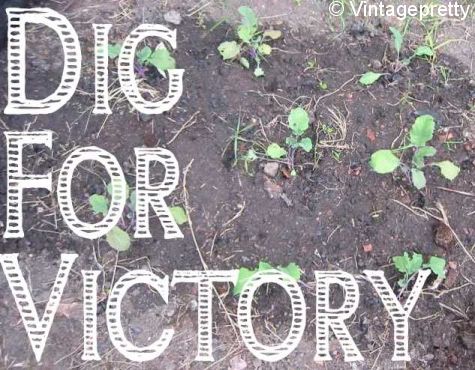Dig For Victory
I'm lucky enough not to remember WWII, but during that time, people were asked to sacrifice any land of theirs - that perhaps was previously used for ornamental purposes - to growing vegetables. This self-sufficiency was a great way for the government to ease the pressure on the suffering merchant vessels which were being hounded out at sea. At its peak, it was estimated that over 1million people had allotments. After the war rationing came to an end, and home-growers slowly stopped growing their own veg. Preferring to buy their produce instead.
Nowadays, nearly everyone in the country buys their food from supermarkets. It's easy, quick, and less hassle than trudging into town to do all of your shopping. But what have we sacrificed in the process? Ongoing worry about pesticide use, equal rights and fair trade for those in third-world countries who have previously been exploited. This is where home-growing really comes into its own. It makes sense, with all the worries we have about food and how it's produced, that we should go back to basics, and take lessons from nature itself.
Since we excavated the veg patch in our own garden, we have been trying to grow some simple veg this first year. There was an obstacle in our way, which was we moved into this house late on in the season (mid- May). This meant that any veg we were going to grow, had to either be late-cropping varieties, or bought-plants from nurseries. We opted for some veg that we'd had experience with before, and that produced good results. We bought tomato, sweetcorn and purple sprouting brocolli as small plants, and have been having great success with them. The carrots and peas were from seeds, and both late-croppers, meaning that it was perfect for our situation.
Being out in the garden is a great feeling, watching your plants come to life and being able to enjoy the sounds of the birdsong, and the cool breeze on your face. It's a marvellous way to relax. There are lots of people in cities who are finding gardening a great way to escape, even if they themselves don't have a garden! Allotments are a great way of doing this, they are in every city and most towns, and are very cheap to rent (cost depends on the particular council). The only problem with allotments is that they have waiting lists, and in popular areas (such as big inner-city areas), the waiting list can be years. The other option is to find someone who perhaps through age, illness or other commitments can no longer look after their garden, and might welcome some help. In return, lending you their land to use. Of course, many councils have schemes for volunteers to help upkeep the local parks and gardens. It's definitely worth enquiring.
Whichever method suits you, there is always a way to get outdoors and enjoy nature at it's best.

Nowadays, nearly everyone in the country buys their food from supermarkets. It's easy, quick, and less hassle than trudging into town to do all of your shopping. But what have we sacrificed in the process? Ongoing worry about pesticide use, equal rights and fair trade for those in third-world countries who have previously been exploited. This is where home-growing really comes into its own. It makes sense, with all the worries we have about food and how it's produced, that we should go back to basics, and take lessons from nature itself.
Since we excavated the veg patch in our own garden, we have been trying to grow some simple veg this first year. There was an obstacle in our way, which was we moved into this house late on in the season (mid- May). This meant that any veg we were going to grow, had to either be late-cropping varieties, or bought-plants from nurseries. We opted for some veg that we'd had experience with before, and that produced good results. We bought tomato, sweetcorn and purple sprouting brocolli as small plants, and have been having great success with them. The carrots and peas were from seeds, and both late-croppers, meaning that it was perfect for our situation.
Being out in the garden is a great feeling, watching your plants come to life and being able to enjoy the sounds of the birdsong, and the cool breeze on your face. It's a marvellous way to relax. There are lots of people in cities who are finding gardening a great way to escape, even if they themselves don't have a garden! Allotments are a great way of doing this, they are in every city and most towns, and are very cheap to rent (cost depends on the particular council). The only problem with allotments is that they have waiting lists, and in popular areas (such as big inner-city areas), the waiting list can be years. The other option is to find someone who perhaps through age, illness or other commitments can no longer look after their garden, and might welcome some help. In return, lending you their land to use. Of course, many councils have schemes for volunteers to help upkeep the local parks and gardens. It's definitely worth enquiring.
Whichever method suits you, there is always a way to get outdoors and enjoy nature at it's best.



















0 Comments:
Post a Comment
<< Home